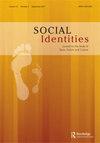韩国的多元文化主义:让移民妻子安分守己
IF 0.9
Q3 ETHNIC STUDIES
引用次数: 0
摘要
本文主要探讨多元文化家庭支持中心(MFSCs)在解释韩国多元文化体系中固有的性别、种族和文化等级方面的作用。自20世纪90年代以来,韩国政府在促进婚姻移民和影响女性婚姻移民的生育和照顾决定方面发挥了积极作用。这反映在移民和福利政策上,鼓励移民妻子生孩子,并给韩国丈夫提供不成比例的权力。在过去的十年中,韩国政府对MFSCs进行了大量投资。这些中心专门为移民妻子提供课程,重点是学习韩国语言和文化。教师一般是年长的韩国女性,学生则是来自发展中国家的移民妻子。韩国文化教育给移民妻子的版本强调传统的儒家家庭角色,妻子的角色是专注于管理家庭,支持丈夫和孩子。我介绍了两个由我担任志愿者的MFSC提供的文化和烹饪课程的案例研究。这些课程表明,韩国的多元文化主义侧重于同化,对韩国丈夫和婆家应该适应外来妻子的期望有限。相反,人们期望外来的妻子们对如何行为有深刻的理解,并理解她们在传统韩国家庭结构中的地位。我提供了移民妻子对这些课程的看法,并解释了为什么她们影响或回应韩国国家和姻亲家庭期望的机会有限。本文章由计算机程序翻译,如有差异,请以英文原文为准。
Multiculturalism in South Korea: putting migrant wives in their place
ABSTRACT This paper focuses on the role of Multicultural Family Support Centers (MFSCs) to explain the gender, race and cultural hierarchies inherent in South Korea’s system of multiculturalism. Since the 1990s the South Korean state has played an active role in facilitating marriage migration and influencing the reproductive and caregiving decisions of female marriage immigrants. This is reflected in immigration and welfare policies that incentivize migrant wives to have children and provide disproportionate power to Korean husbands. Over the past decade the Korean government has invested heavily in MFSCs. These centers cater exclusively to migrant wives with courses focused on the acquisition of the Korean language and culture. The teachers are generally older Korean women while students are migrant wives from developing countries. The version of Korean culture taught to migrant wives emphasizes traditional Confucian family roles and that a wives’ role is to focus on managing the home and supporting her husband and children. I present two case studies of cultural and cooking classes provided by a MFSC where I volunteered. The classes illustrate that multiculturalism in South Korea is focused on assimilation with limited expectation that Korean husbands and in-law families should adapt to migrant wives. Instead, migrant wives are expected to acquire a strong understanding of how to behave and understand their place in a traditional Korean family structure. I provide migrant wives’ perspectives on these classes and explain why they have limited opportunity to influence or respond to the expectations of the Korean state and in-law families.
求助全文
通过发布文献求助,成功后即可免费获取论文全文。
去求助
来源期刊

Social Identities
ETHNIC STUDIES-
CiteScore
2.00
自引率
0.00%
发文量
22
期刊介绍:
Recent years have witnessed considerable worldwide changes concerning social identities such as race, nation and ethnicity, as well as the emergence of new forms of racism and nationalism as discriminatory exclusions. Social Identities aims to furnish an interdisciplinary and international focal point for theorizing issues at the interface of social identities. The journal is especially concerned to address these issues in the context of the transforming political economies and cultures of postmodern and postcolonial conditions. Social Identities is intended as a forum for contesting ideas and debates concerning the formations of, and transformations in, socially significant identities, their attendant forms of material exclusion and power.
 求助内容:
求助内容: 应助结果提醒方式:
应助结果提醒方式:


